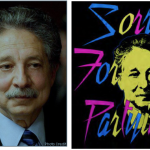Under the Digital Millennium Copyright Act (DMCA), a lower grandfathered royalty rate is paid by some music services that were early providers of digital music transmissions. Music Choice, a digital broadcast music service that consists of s…
Search Results for: copyright
Johnson v. Copyright Royalty Board
In these consolidated appeals, appellants challenge the royalty rates and terms established by the Board for the period of January 1, 2018 through December 31, 2022. Appellants challenged numerous aspects of the Board’s final determination: …
Independent Producers Group v. Copyright Royalty Board
IPG, an agent for royalty claimants in these proceedings, filed suit challenging Copyright Royalty Judges’ denial of most of its clients’ royalty fee claims for programming in the devotional and program suppliers’ categories that was retrans…
SoundExchange, Inc. v. Copyright Royalty Board and Librarian of Congress
Plaintiffs challenged the Copyright Royalty Board’s most recent determination for rates noninteractive webcasters must pay to play recordings over the Internet under a statutory copyright license. The DC Circuit sustained the Board’s determi…
SoundExchange, Inc. v. Copyright Royalty Board and Librarian of Congress
Plaintiffs challenged the Copyright Royalty Board’s most recent determination for rates noninteractive webcasters must pay to play recordings over the Internet under a statutory copyright license. The DC Circuit sustained the Board’s determi…
Stanford Copyright & Fair Use – Key Overview Updates
Q: Thank you for updating the copyright overview on this site. What are the most important changes that you want us to know? A: Because the update reflects changes from 2014 through 2016 it includes a few decisions that readers may be familiar with such as the Google book scanning decision (Author’s Guild v. Hathitrust, […]
protect your site from copyright lawsuits
Everyone who thought they were protected from copyright lawsuits based on user postings, read this and take action on December 1st 2016 and no later than December 2017. lawofthelevel.com/2016/11/articles/intellectual-property/dont-lose-dmca-safe-harbor-protection/
How much of a photo do you need to alter to avoid copyright infringement? Hint: Cheshire Cat
Bloggers and artists often ask, “how much of a photo do you need to alter to avoid copyright infringement?” Five changes? Fifteen? The Seventh Circuit addressed the issue in the Kienitz v Sconnie Nation case recently. According to the court, Sconnie Nation made t-shirts displaying an image of Madison Wisconsin mayor Paul Soglin, using […]
Music Choice v. Copyright Royalty Bd.
“Musical work” and the owner’s exclusive right to perform the work in public are protected by 17 U.S.C. 106(4). Broadcast of a musical work is a performance and requires a license from the copyright owner. Copyright Act amendments afford the copyright owner of a sound recording “the narrow but exclusive right ‘to perform the copyrighted work publicly by means of a digital audio transmission.’” The law requires “certain digital music services . . . to pay recording companies and recording artists when they transmit[] sound recordings” and provides for appointment of three Copyright Royalty Judges. If sound recording copyrights owners are unable to negotiate a royalty with digital music services, the Judges may set reasonable rates and terms. The Judges set royalty rates and defined terms for statutorily defined satellite digital audio radio services (SDARS) and preexisting subscription services (PSS). SoundExchange, which collects and distributes royalties to copyright owners, argued that the Judges set rates too low and erred in defining “Gross Revenues” and eligible deductions for SDARS. A PSS that provides music-only television channels appealed, arguing that PSS rates were set too high. The D.C. Circuit affirmed, concluding that the Judges of the Board acted within their broad discretion and on a sufficient record. View “Music Choice v. Copyright Royalty Bd.” on Justia Law
Music Choice v. Copyright Royalty Bd.
“Musical work” and the owner’s exclusive right to perform the work in public are protected by 17 U.S.C. 106(4). Broadcast of a musical work is a performance and requires a license from the copyright owner. Copyright Act amendments afford the copyright owner of a sound recording “the narrow but exclusive right ‘to perform the copyrighted work publicly by means of a digital audio transmission.’” The law requires “certain digital music services . . . to pay recording companies and recording artists when they transmit[] sound recordings” and provides for appointment of three Copyright Royalty Judges. If sound recording copyrights owners are unable to negotiate a royalty with digital music services, the Judges may set reasonable rates and terms. The Judges set royalty rates and defined terms for statutorily defined satellite digital audio radio services (SDARS) and preexisting subscription services (PSS). SoundExchange, which collects and distributes royalties to copyright owners, argued that the Judges set rates too low and erred in defining “Gross Revenues” and eligible deductions for SDARS. A PSS that provides music-only television channels appealed, arguing that PSS rates were set too high. The D.C. Circuit affirmed, concluding that the Judges of the Board acted within their broad discretion and on a sufficient record. View “Music Choice v. Copyright Royalty Bd.” on Justia Law

